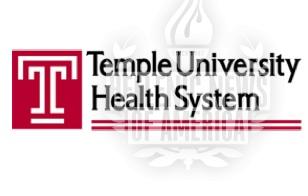Temple’s Bone Marrow Transplant Program Celebrates 25 Years of Life-Saving Patient Care
(Philadelphia, PA) – Temple is celebrating the 25-year anniversary of the first bone marrow transplant performed as part of the Temple Bone Marrow Transplant Program. The program’s first transplant was performed by its founding Director, Dr. Kenneth F. Mangan, on February 29, 1988. Since then, Temple has performed more than 1,400 transplants, with nearly 600 patients still surviving today. The program currently averages about 80 procedures each year.
“This is a memorable day for the Temple Bone Marrow Transplant Program,” said Thomas R. Klumpp, MD, FACP, the current Clinical Director of the Temple Bone Marrow Transplant Program. “Since 1988, more than 2,500 patients with leukemia, lymphoma, multiple myeloma, and other blood cancers have sought out Temple’s Bone Marrow Transplant Program. We are proud of the fact that our skilled medical team has been able to offer those patients the most advanced methods of diagnosis and treatment available.”
The Temple Bone Marrow Transplant team is located on the Fox Chase Cancer Center-Jeanes Hospital campus. It includes transplant physicians, mid-level practitioners, clinical nurses, research nurses, transplant coordinators, social workers, financial counselors, data managers, a certified nutritionist, a board certified psychiatrist, a statistician, and support groups to help patients and their loved ones through the transplant process.
The Temple Bone Marrow Transplant Program treats patients with leukemia, lymphoma, multiple myeloma, aplastic anemia and other blood disorders. To schedule a consultation, call 215-214-3122.
About Temple Health
Temple Health refers to the health, education and research activities carried out by the affiliates of Temple University Health System and by Temple University School of Medicine.
Temple University Health System (TUHS) is a $1.4 billion academic health system dedicated to providing access to quality patient care and supporting excellence in medical education and research. The Health System consists of Temple University Hospital (TUH), ranked among the “Best Hospitals” in the region by U.S. News & World Report; TUH-Episcopal Campus; TUH-Northeastern Campus; Fox Chase Cancer Center, an NCI-designated comprehensive cancer center; Jeanes Hospital, a community-based hospital offering medical, surgical and emergency services; Temple Transport Team, a ground and air-ambulance company; and Temple Physicians, Inc., a network of community-based specialty and primary-care physician practices. TUHS is affiliated with Temple University School of Medicine.
Temple University School of Medicine (TUSM), established in 1901, is one of the nation’s leading medical schools. Each year, the School of Medicine educates approximately 840 medical students and 140 graduate students. Based on its level of funding from the National Institutes of Health, Temple University School of Medicine is the second-highest ranked medical school in Philadelphia and the third-highest in the Commonwealth of Pennsylvania. According to U.S. News & World Report, TUSM is among the top 10 most applied-to medical schools in the nation.








